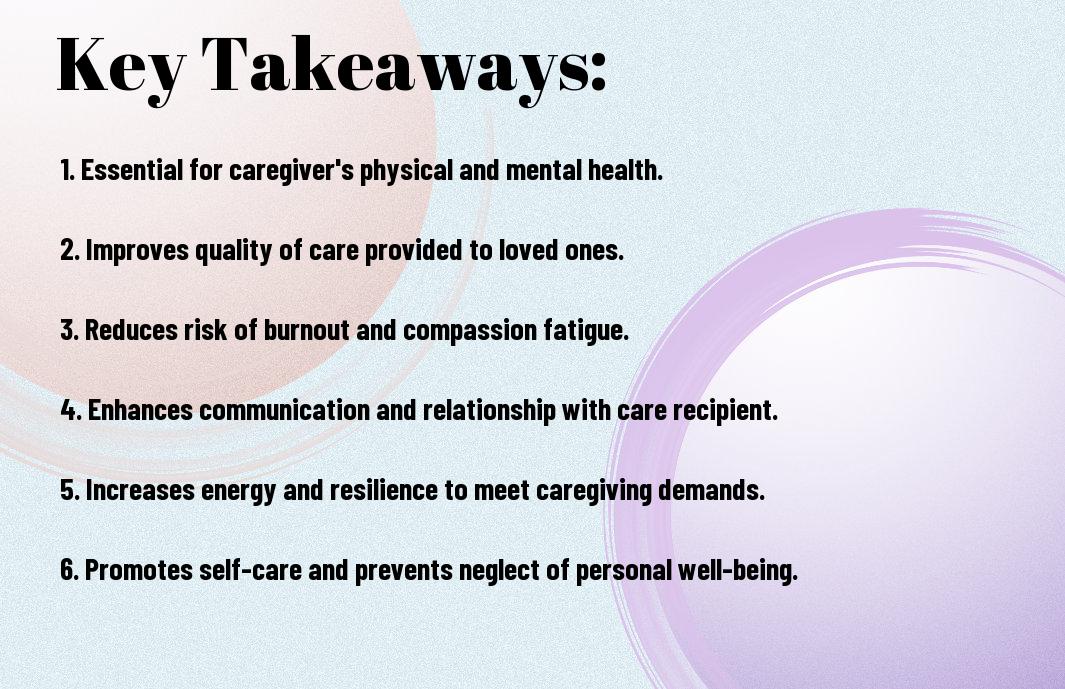#Caregivers shoulder immense responsibilities taking care of their loved ones at home. Prioritizing wellness is crucial for maintaining physical and mental well-being. Neglecting self-care can lead to burnout and negatively impact the quality of care provided. This blog post will discuss the reasons why primary caregivers should make their wellness a priority and provide practical tips for achieving balance while caring for others.
Key Takeaways:
- Wellness is necessary: Prioritizing wellness for primary caregivers at home is crucial for their physical, emotional, and mental health.
- Prevent burnout: Taking care of caregivers’ well-being helps in preventing burnout, which can have detrimental effects on their ability to provide care effectively.
- Enhances caregiving quality: When caregivers prioritize their own wellness, they are better equipped to provide high-quality care to their loved ones.
- Improves overall family dynamics: A caregiver who takes care of their well-being can contribute positively to the overall family dynamics, creating a healthier and happier environment at home.
- Support system is key: Creating a support system for caregivers, whether through resources, therapy, or community, is vital in helping them prioritize their wellness.

The Unseen Consequences of Neglecting Caregiver Wellness
Burnout and Compassion Fatigue
Wellness for primary caregivers is crucial in preventing burnout and compassion fatigue. Burnout is a state of emotional, physical, and mental exhaustion caused by excessive and prolonged stress, which can lead to a reduced ability to empathize with others. Compassion fatigue, on the other hand, is the emotional and physical burden felt by those who care for others in distress. When caregivers neglect their own well-being, they are more likely to experience high levels of stress, emotional fatigue, and a decreased sense of personal accomplishment.
Recognizing the signs of burnout and compassion fatigue early on is important in addressing these challenges. Providing primary caregivers with the necessary support, resources, and opportunities for self-care can help mitigate the risks associated with these conditions. By prioritizing wellness, caregivers can build resilience, maintain a sense of purpose, and continue to provide high-quality care to their loved ones.
It is important for caregivers to remember that self-care is not selfish. Taking time to recharge, seek support from others, and engage in activities that bring joy and fulfillment are important in sustaining long-term caregiving roles. By practicing self-compassion and setting boundaries, caregivers can protect themselves from the detrimental effects of burnout and compassion fatigue.
Impact on Mental and Physical Health
For primary caregivers, neglecting their wellness can have significant implications on their mental and physical health. Chronic stress, anxiety, and depression are common among caregivers who do not prioritize self-care. Physical ailments such as fatigue, sleep disturbances, and weakened immune systems can also arise from neglecting one’s well-being.
Caregivers who experience high levels of stress and emotional exhaustion are at a greater risk of developing long-term health conditions. The constant demands of caregiving without proper self-care can take a toll on both the mind and body. It is crucial for caregivers to pay attention to their own needs and seek help when necessary to prevent the negative impact on their overall health.
Caregivers must remember that their well-being is just as important as the well-being of those they care for. By prioritizing self-care and seeking support, caregivers can better manage the challenges that come with caregiving roles. Taking care of oneself is not only beneficial for the caregiver but also for the quality of care they are able to provide to their loved ones.

The Ripple Effect of Caregiver Wellness on Loved Ones
Improved Quality of Care
One of the critical ways in which caregiver wellness can have a positive impact on loved ones is through the improved quality of care they are able to provide. When a primary caregiver is well-rested, emotionally supported, and physically healthy, they are better equipped to meet the needs of their loved ones. This results in a higher standard of care that can positively affect the well-being and health outcomes of the care recipient.
Furthermore, caregivers who prioritize their wellness are more likely to have the energy and patience to handle the challenges that come with caregiving. They are better able to make sound decisions, communicate effectively with healthcare providers, and provide the necessary support for their loved ones. This can lead to a more seamless caregiving experience and better overall quality of life for both the caregiver and care recipient.
Ultimately, by focusing on their own wellness, caregivers can create a ripple effect that benefits not only themselves but also the loved ones they care for. Improved quality of care leads to better health outcomes, increased satisfaction for both parties, and a stronger bond between the caregiver and care recipient.
Enhanced Emotional Support
One significant effect of caregiver wellness on loved ones is enhanced emotional support. Caregiving can be emotionally taxing, leading to feelings of burnout, stress, and even resentment. When caregivers prioritize their own emotional well-being, they are better equipped to provide the necessary emotional support for their loved ones.
Emotional support plays a crucial role in the overall well-being of individuals requiring care. When caregivers are emotionally stable and supported, they can offer comfort, empathy, and reassurance to their loved ones. This can lead to a more positive caregiving experience, improved mental health outcomes, and a stronger sense of connection between the caregiver and care recipient.
By focusing on enhancing emotional support through caregiver wellness, the ripple effect extends to improved relationships, better communication, and a more nurturing caregiving environment for everyone involved. When caregivers prioritize their emotional well-being, they are better positioned to provide the love and support that their loved ones truly need.
Practical Strategies for Prioritizing Caregiver Wellness
Self-Care Rituals for Stress Relief
Stress is a common companion for primary caregivers, but implementing self-care rituals can help mitigate its effects. Prioritizing self-care is crucial for maintaining optimal wellbeing while tending to the needs of others. Incorporating practices such as mindfulness meditation, deep breathing exercises, or gentle yoga can provide moments of relaxation and rejuvenation amid the chaos of caregiving responsibilities. Additionally, seeking professional guidance or resources like Prioritizing Self-Care for Optimal Wellbeing – Home Choice NY can offer valuable insights on incorporating self-care into daily routines.
Building a Support Network
On the journey of caregiving, having a strong support network can make all the difference. Reach out to friends, family members, or local caregiver support groups to connect with individuals who understand the unique challenges you face. Building a support network can provide emotional validation, practical advice, and much-needed respite from the demands of caregiving. Recall, you do not have to navigate this journey alone, and seeking support is a sign of strength, not weakness.
Rituals such as attending support group meetings, scheduling regular check-ins with loved ones, or even participating in online forums can help you feel connected and supported. Prioritizing the cultivation of a robust support network is an investment in your overall wellbeing as a caregiver, ensuring you have the resources and encouragement needed to navigate the caregiving journey with resilience and grace.

Breaking Down Barriers to Caregiver Wellness
Overcoming Guilt and Shame
For primary caregivers at home, feelings of guilt and shame often accompany the decision to prioritize their own health and well-being. Caregivers may feel selfish for taking time for themselves or seeking assistance, believing they should be entirely devoted to their loved one’s care. However, it is crucial to realize that self-care is not selfish; it is important for sustaining the ability to provide quality care. By acknowledging and addressing these emotions, caregivers can better understand that their well-being is directly linked to the quality of care they provide.
Recognizing the importance of self-care does not diminish a caregiver’s dedication or love for their loved one; instead, it enhances their ability to be present, patient, and compassionate. Seeking support and incorporating self-care practices can alleviate burnout and improve overall mental and physical health. It is vital for caregivers to let go of any guilt or shame associated with prioritizing their own wellness and understand that it is a necessary aspect of fulfilling their caregiving role effectively.
The Importance of Prioritizing Your Health as a Caregiver emphasizes the significance of self-care for caregivers. By overcoming guilt and shame, caregivers can create a healthier and more sustainable caregiving routine that benefits both themselves and their loved ones in the long run.
Redefining Selflessness
Barriers to caregiver wellness often stem from a misconstrued perception of selflessness. Caregivers may believe that sacrificing their own needs and well-being for their loved one is the epitome of selflessness. However, true selflessness encompasses caring for oneself in addition to others. Redefining selflessness to include self-care allows caregivers to maintain their health and energy levels, ultimately enabling them to provide better support to their loved one.
Understanding that taking care of oneself does not detract from caregiving responsibilities but enhances them is pivotal in breaking down barriers to caregiver wellness. By prioritizing self-care, caregivers can cultivate a healthier mindset and prevent the physical and emotional toll that often accompanies prolonged caregiving without proper attention to personal well-being.
Recognizing the importance of redefining selflessness in the context of caregiving can lead to a positive shift in mindset for primary caregivers at home. By embracing self-care as an integral part of their caregiving role, caregivers can foster a sustainable and fulfilling caregiving experience for themselves and their loved ones.
Final Words
Ultimately, prioritizing wellness for primary caregivers at home is vital for maintaining the health and well-being of both the caregivers and the individuals they are caring for. By taking care of themselves and ensuring their own physical, mental, and emotional needs are met, caregivers are better equipped to provide quality care to their loved ones. Neglecting their own wellness can lead to burnout, increased stress, and decreased quality of care, ultimately impacting the overall well-being of the entire household.
Recognizing the importance of self-care and wellness for caregivers can lead to improved outcomes for both the caregivers and care recipients. Providing resources, support, and education on wellness practices can empower caregivers to prioritize their own health while effectively caring for others. By investing in the well-being of primary caregivers, we are investing in the stability and sustainability of home caregiving arrangements, ultimately benefiting the individuals in need of care and the caregivers themselves.
Summing up, prioritizing wellness for primary caregivers at home is not only beneficial for the individuals receiving care but also crucial for the overall health and resilience of the caregiving relationship. By acknowledging the vital role that caregivers play and implementing strategies to support their well-being, we can create a more sustainable and compassionate caregiving environment. It is imperative that caregivers are encouraged, supported, and valued in their role, as their wellness directly impacts the quality of care they are able to provide. Ultimately, prioritizing wellness for primary caregivers at home is a necessary step towards creating thriving and resilient caregiving communities.
FAQ
Q: Why is it important to prioritize wellness for primary caregivers at home?
A: Prioritizing wellness for primary caregivers at home is crucial as it helps in maintaining their physical, mental, and emotional well-being, enabling them to provide better care for their loved ones. Neglecting their own health can lead to burnout, stress, and decreased quality of care.
Q: What are some practical ways to prioritize wellness for primary caregivers at home?
A: Practical ways to prioritize wellness include setting boundaries, seeking support from others, practicing self-care activities such as exercise, mindfulness, and relaxation techniques, taking breaks when needed, and scheduling regular check-ups with healthcare providers.
Q: How can prioritizing wellness benefit both the caregiver and the care recipient?
A: Prioritizing wellness benefits both the caregiver and the care recipient by improving the caregiver’s ability to provide quality care, reducing stress levels, fostering a positive relationship between the caregiver and care recipient, and enhancing overall well-being for both parties.
Q: What are the consequences of neglecting wellness for primary caregivers at home?
A: Neglecting wellness for primary caregivers can lead to burnout, fatigue, increased risk of health problems, emotional distress, strained relationships, decreased quality of care for the care recipient, and a negative impact on the overall caregiving experience.
Q: How can employers or organizations support primary caregivers in prioritizing their wellness at home?
A: Employers and organizations can support primary caregivers by offering flexible work arrangements, providing resources for caregiver support, promoting wellness programs, offering counseling services, recognizing and acknowledging the caregiver’s efforts, and creating a supportive work culture that values work-life balance.



